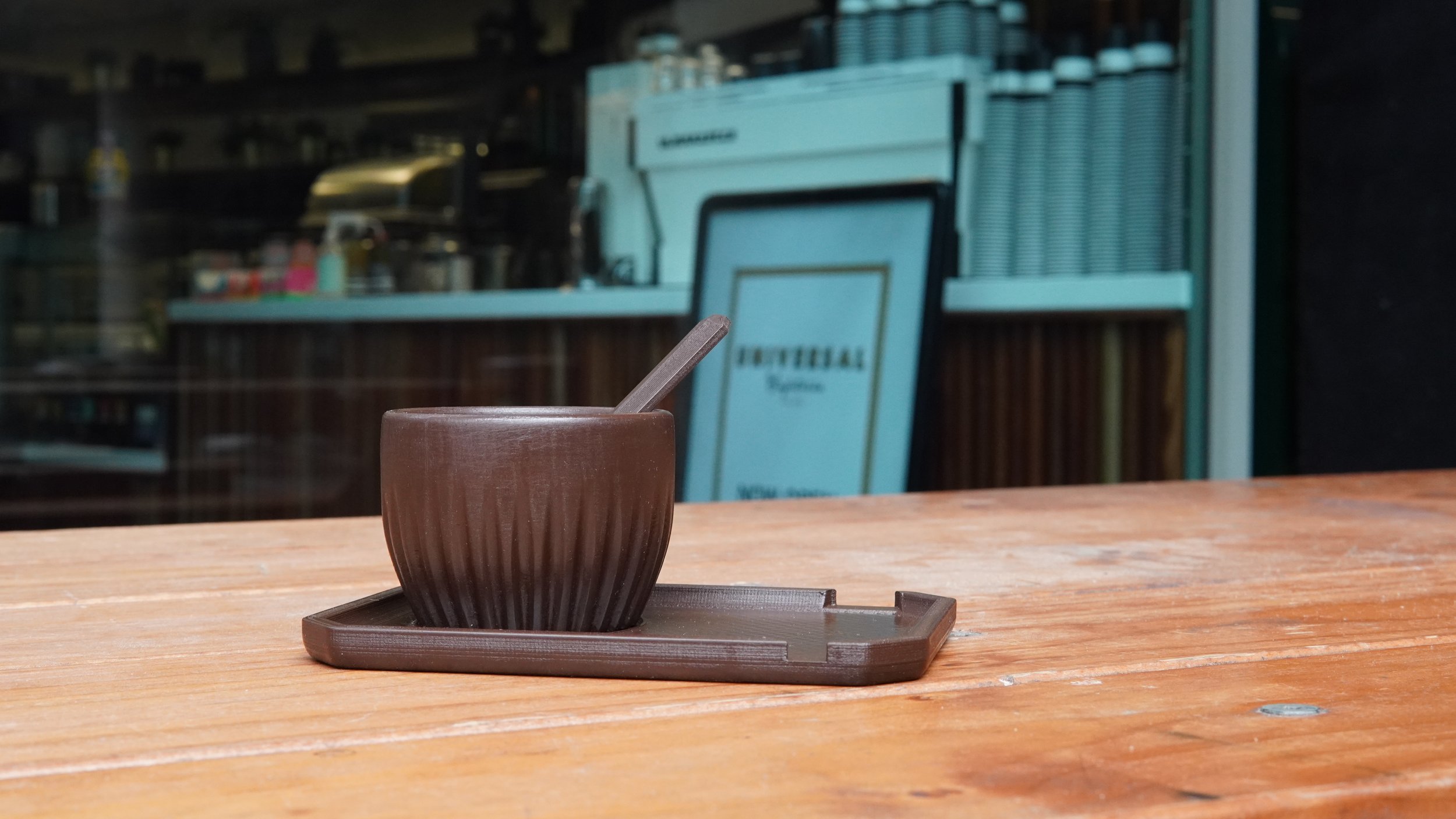Reformation of a Throw Away Culture
by Nathaniel Adamson
Contextual rendering
Final prototype
Abstract
This research investigates the unsustainable use of single use plastics within today’s culture. Single use plastic objects are designed with the intent of disposal, as they have a limited life cycle of usability, and decomposition of the material can take centuries. Aiming to challenge current perceptions of a throw away culture, this project adopts a design-led approach to exploring a more sustainable material — spent coffee grounds. A literature review investigates the current effects of plastics and the culture that surrounds the material. In addition, the research explores the viability of replacement materials and the desire of individuals to embrace and use these.
Spent coffee grounds can be processed to achieve the utility characteristics that plastics have, while providing a more ecological solution to the prevalence of single use plastics.
Conclusions about the viability of the material as a bio-based replacement are drawn through the process of material formulation design and physical prototyping, which test numerous characteristics of aesthetics and structural properties. The technique of upcycling a waste material can achieve an enhanced customer experience.
The choice of topology is informed by observational and survey research methods to identify the most used products. Targeting the most used products will ensure a viable market and the highest impact of a bio replacement product within the hospitality sector.
“The primary investigation identified the possibility of developing new products for the hospitality sector. This sector is a main contributor to the rise of single use plastic and regularly discards useful biomass.”
Final product exploded view
Design Intent
When designers develop products that adopt sustainable practices through the utilisation of waste biomaterial, their practices can have far-reaching social and environmental impacts. The proposed design of compostable tableware made from spent coffee grounds in a micro-factory setting within the café itself brings innovation to the meaning of production. The vision is to transition from centralised industrial facilities that supply globally to localised micro-factories that produce only what they need by inventively using materials available to them. This research can be generalised and adapted by a range of industries that aren’t operating with product manufacturing as their primary business model.
The intention behind the research project is to challenge the traditional conventions of a throwaway culture. The need for convenience and overconsumption has blinded society to the material wastefulness that surrounds it. This project incorporates spent coffee grounds as a viable bio infill for compostable tableware, which challenges widely upheld, traditional views of how society sees and treats waste materials. The produced artefacts evoke a sense of curiosity and prompt a profound realisation of how much avoidable waste surrounds a simple daily interaction, such as ordering a takeaway coffee.
The service system is designed as a micro-factory production of the artefacts as they’re needed, thus reducing the effects of overconsumption. This system ends in an environmentally sustainable practice, dubbed as ‘eco-littering’, as the compostable material breaks down within six months under natural conditions. The project does not aim to revolutionise and eradicate a throwaway society; rather, it aims to highlight how designers can reform practices and change wasteful habits in sustainable ways for the betterment of society.
“The product design prototype and design process act as a catalyst to challenge individuals’ perspective on the overconsumption of single use products and bio-waste materials. The compostable tableware can, in a small way, enable a positive change in the human condition by taking responsibility for the ecology of our planet. Society, instead of being the source of the problem, becomes the force for change by adopting an ethic of responsible usage and disposal.”
Micro-factory tooling
Product undergoing composting
Product perception
Bio
I am an honours graduate in product design at the University of Technology, Sydney. Through my studies, I have developed a passion for combining advanced technology methods with a sustainable design approach. When beginning my honours degree, my part-time work within a café allowed me to see firsthand the careless nature of the Australian culture. In an age where sustainability holds great significance, it remains upstaged by convenience. Therefore, a shift in consumer habits needs to be addressed. As a designer, I believe this is a crucial space in which to focus my energy.
Throughout my degree and industry projects I’ve developed a passion for the limitless capabilities within advanced manufacturing technologies. I am interested in how products and objects connect, influence, and grow with users.
previous project / next project
Copyright UTS Product Design 2020

